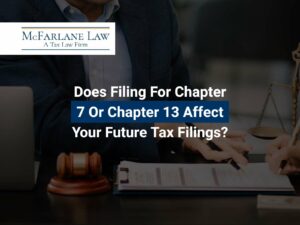Blog
-

Does Filing For Chapter 7 Or Chapter 13 Affect Your Future Tax Filings?
Filing for bankruptcy can be an intimidating process that brings up many questions. However, one of the…
Continue Reading → -
What to Do When You Cannot Pay Your Taxes
When you need assistance in resolving a tax issue, you can rely on our experience and knowledge…
Continue Reading → -
WE’VE GONE VIRTUAL!!
McFARLANE LAW-A Tax Law Firm is now a virtual law firm! Send any mail or correspondence to:…
Continue Reading → -
Tips for people starting a new business
Understanding the tax responsibilities that come with starting a business venture can save taxpayers money and help…
Continue Reading → -
Beware: The IRS is Sending Important Notices with Bad Dates
Several of my clients received IRS Notices with due dates that already expired by the time I…
Continue Reading → -
The IRS Has Been Sending Notices with Bad Dates
Taxpayers need to keep a careful eye on their IRS Notices. Many IRS Notices, many with statutory…
Continue Reading → -
I Owe Past Due Taxes. Can the IRS Take My $1200 Economic Impact Payment?
Generally, the answer is no. The exception is if the taxpayer owes child support arrearages.Under the CARES…
Continue Reading → -
Q: What if I cannot Pay my Taxes by the July 15 Deadline?
A: Taxpayers should file on time even if they cannot pay their full tax bill You should…
Continue Reading → -
The honeymoon is over – Part III
In previous blogs The Honeymoon is Over – It’s Time to Think Taxes! and It's Time to…
Continue Reading → -
Do you have a foreign bank account or own an interest in foreign real estate or in a foreign entity?
The IRS continues its pursuit of “US Citizens” who own a foreign bank account, foreign real estate,…
Continue Reading → -
Nursing Homes and Care Facilities and Economic Impact Payments
There has been stories that nursing homes and other care facilities have been taking their resident’s/patient’s Economic…
Continue Reading → -
The IRS can garnish your Social Security
If you or your spouse collects social security benefits and have been assessed past due taxes or…
Continue Reading → -
It’s Time to Prepare and File your 2019 Tax returns
The Honeymoon is Over: Part Deux If you have not filed your 2019 individual income or business…
Continue Reading → -
Can’t Pay Your Tax Liability? Is an Offer-in-Compromise Right for You?
There are certain tax problems that require the assistance of a tax attorney, and determining if an…
Continue Reading → -
The Honeymoon is Over – It’s Time to Think Taxes!
Remember: An extension to file is not an extension to pay taxes For most taxpayers (including individual,…
Continue Reading → -
Have You Filed Your 2019 Tax Returns?
As you know, the deadlines to file and pay 2019 federal income taxes have been postponed to…
Continue Reading → -

As Society Reopens, Don’t Be Duped by ‘Tax Relief Experts’
As we come out of the COVID-19 societal lockdown and you have significant tax problems to resolve,…
Continue Reading → -
I took an Early Withdrawal from my Retirement Account. Now what?
On a regular basis I get clients who have taken a distribution out of their qualified individual…
Continue Reading → -
Is your Business Subject to a Transaction Privilege (Sales) or Use Tax Audit?
States are increasingly looking to audits and enforcement to raise much needed revenue, and Arizona is especially…
Continue Reading → -
The $10,000 Federal Tax Deduction Limit on Payments for State & Local Taxes
The Treasury Department and the IRS intend to propose regulations addressing the federal income tax treatment of…
Continue Reading → -
Considerations for Taxpayers Who Need to Amend a Return
Taxpayers who discover they made a mistake on their tax returns after filing can file an amended…
Continue Reading → -
Missed the 2017 tax return filing or payment deadline? Here is what you need to do
The 2017 federal income tax-filing deadline has passed for most people who did not extend the filing…
Continue Reading → -
How Long Should I Maintain My Tax Records?
I am often asked, “how many years of records do I need to keep?” As a general…
Continue Reading → -
How Does the TCJA Effect the 2018 Tax Year Inflation Adjustments
The Internal Revenue Service has updated the tax year 2018 annual inflation adjustments to reflect changes from…
Continue Reading → -
IRS Audit Rates Continue Downward Spiral
For years, IRS audit rates have been declining as Congress has cut the IRS budget and its…
Continue Reading → -
Small Business Employers: Are Your Workers Classified Correctly?
McFARLANE LAW-A Tax Law Firm provides step-by-step guidance to ensure employees are classified correctly and that your…
Continue Reading → -
IRS declares that 2018 Property Taxes Must Be Assessed and Paid in 2017 to Claim a Full Deduction
The IRS issued IR-2017-210 saying property taxes must be assessed and paid before 2018 in order to…
Continue Reading → -
Get Ready for Taxes
Taxpayers should work now to ensure the timely and complete preparation and processing of their 2017 tax…
Continue Reading → -
Five Things to Remember about Hobby Income and Expenses
Many taxpayers enjoy hobbies that are also a source of income. A taxpayer must report taxable income…
Continue Reading → -
Transaction Privilege Tax License Renewals Due January 1, 2018
Every business licensed with ADOR is required to renew their Arizona Transaction Privilege Tax (TPT) license by…
Continue Reading → -

Tax Controversy with IRS over Foreign Bank Accounts or Assets
Should you receive a letter from your Swiss bank, you need to seek experienced tax counsel to…
Continue Reading → -

Can I object to a denial or rejection of my OIC?
Yes! A taxpayer has the right to object to the denial of an offer-in-compromise application and any…
Continue Reading → -

Arizona Enacts Tax Amnesty Legislation to Provide a Waiver of Penalties and Interest
On March 12, 2015, Arizona enacted 2015 Senate Bill 1471, which establishes a tax recovery (amnesty) program…
Continue Reading → -

Do You Have Employment and Payroll Tax Issues?
Employment & Payroll Tax Liability and the Trust Fund Recovery Penalty – not an easy workout! Sometimes…
Continue Reading → -

What is the difference between a proposed asseessment and an assessment and why does it matter?
Reduction or Elimination of Penalties -when can I request a reduction and what is the effect if…
Continue Reading →